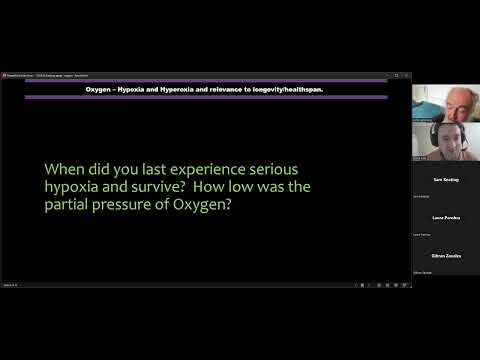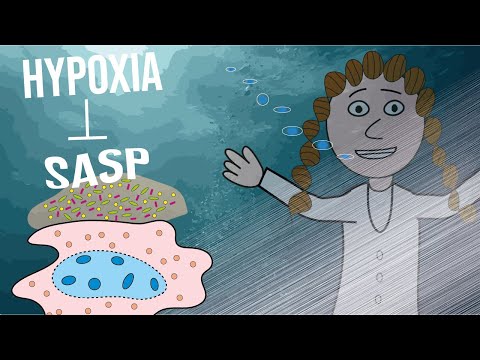Discussion about Oxygen, Hypoxia and Hyperoxia 2024 03 30 AntiAging Reading Group:
My lowest O2 was at 21000 feet (Illimani). It was a gradual acclimatization over a few weeks. But still very hard to exercise at that altitude.
Skip to 1:12:00 to get to hypoxia presentation.
This is very interesting. Thanks @John_Hemming
Website for speaker in video about the health benefits of periodic hypoxia.
I’m familiar with sleep tents used to simulate high altitude. I do breath holds every week to improve my co2 tolerance. Maybe I’m getting more benefit in the effort.
Dr. Joseph Purita says he targets <90 SpO2 for his clients hypoxia treatments. I will start doing that just by breathing more slowly for a few minutes. My co2 tolerance work involves full exhale with no hyperventilation then hold. It is very terrible.
30 seconds is the minimum for okay co2 tolerance. 60 seconds is good. I’m up to 90 seconds on good days. Today was 50 seconds. My SpO2 fell to 62. My low is 56.
I prefer to use the approach of increasing pO2 to a hyperoxic level (say 60%) using an Oxygen concentrator and then dropping back to 21% normoxia.
No doubt that is less unpleasant.
I do it whilst doing work on my computer.
You got to 62 just with breath control? That’s impressive – how long, and how, did you train to achieve this?
Yes. My best was 56. The protocol is this;
- Sit in a chair. Not near water or anything that would go badly if you fainted. If this is your first time, go slowly. The idea is to improve your health not to report back amazing results on your first try. I’ve been working on this for 15 weeks, and I have done co2 tolerance work in the past.
- Take 3 normal breaths with no hyperventilation or anything out of the ordinary. Use normal level of inhale and exhale (ie, not “full” or “deep”) It’s just to make the test the same every time.
- Exhale fully and start the clock. You will feel an urge to exhale but you cannot unless you didn’t fully exhale. Start over in that case.
- If you feel like you might die or faint or your vision starts to narrow…I’d stop if I were you.
- Be sure to press the stop button on your timer when you take a breath (even a little one)
- Results:
A — probably won’t hit 30 seconds. Work up to this. This is basic good normal human.
B— if you want more, aim for 60 seconds. This is amazing hard work. You will not like it. Try to add 1-2 seconds each week (1 do this 1x/week).
C — 2 minutes is elite, I understand. I don’t care if I get there.
I use a pulse ox to track SpO2 before, during, and after the test. I repeat the test at least once a week. I can hold my breath longer the second time but my SpO2 doesn’t go as low. I suppose my spleen has contributed some blood to the system.
Dont hurt yourself. This might actually be a stupid thing to do. I do stuff like that sometimes.
Today was my first effort at holding a <90% SpO2. It was hard to get to 89%. It took about 5 minutes of concentrated effort to get there. Then I held it with very shallow breathing for 5 minutes. It was not as hard or death defying feeling as the breath hold but still unpleasant. I held it for 5 minutes. I’ll add this to my weekly stack.
I think using hyper then norm is a lot easier.
Paper on effect of hypoxia training on athletic performance.
https://www.sciencedirect.com/science/article/pii/S2405844024036387
Here is the paper referenced
https://www.sciencedirect.com/science/article/pii/S1568163721000143?via%3Dihub
I’m not sure. I suffer from sleep apnea. I use the CPAP but usually at night after 3 hours I’ll remove it and continue sleeping for an hour before I get up and put it back on. My O2 drops below 90 regularly. As low as 76%. Are you saying this is good? ![]()
That said I scuba dive 3x a week. I can do 60 minutes of single breath per minute, mainly as part of my meditation, possibly more but it is incredibly boring.
I wouldn’t bet on poor sleep being good for longevity but a little bit of hypoxia seems to have positive effects. However a lot of hypoxia seems like too much of a good thing. Good luck.
A little bit is OK, but taking it up then back down seems best to me. I am doing it whilst I am typing now, but I will now stop and revert to normoxia.
She talks about Roxadustat:
https://www.astrazeneca.com/media-centre/press-releases/2021/update-on-us-review-of-roxadustat.html#
It causes you to want to build more red blood cells , kind of a hypoxia mimetic. I’d like it tried on the ITP. Along with everything else, lol.


